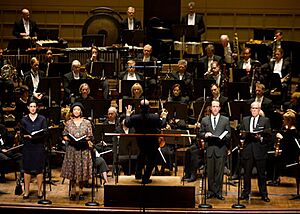Steven Stucky facts for kids
Steven Edward Stucky (born November 7, 1949 – died February 14, 2016) was an American composer who won the Pulitzer Prize for Music, a very important award for music. He wrote many different kinds of music, including pieces for orchestras, operas, and songs for choirs.
Contents
Steven Stucky's Life and Music Journey
Steven Stucky was born in Hutchinson, Kansas. When he was nine, his family moved to Abilene, Texas. As a teenager, he learned a lot about music in school. He also took private lessons, studying the viola, how to conduct music, and how to compose (write) music. He continued his music studies at Baylor University and later at Cornell University.
Steven Stucky became a very popular composer. Many big American orchestras asked him to write music for them. These included famous groups like the Los Angeles Philharmonic, the New York Philharmonic, and the Chicago Symphony Orchestra.
He worked closely with the Los Angeles Philharmonic for a long time, from 1988 to 2009. This was the longest time any composer had worked with an American orchestra! He also hosted a music series for the New York Philharmonic. In 2011-2012, he was named the Composer of the Year for the Pittsburgh Symphony Orchestra. For them, he wrote a piece called Silent Spring. This music honored a famous book by Rachel Carson with the same name, which was about protecting nature.
Steven Stucky also wrote his first opera, The Classical Style. An opera is a play where most of the words are sung. He worked with a famous pianist and writer named Jeremy Denk on this project. The opera was first performed in June 2014.
Some of his other well-known pieces include Radical Light (a symphonic poem), Rhapsodies for Orchestra, and a large musical story called an oratorio, August 4, 1964. He also wrote a Symphony and his Second Concerto for Orchestra. This Second Concerto won the Pulitzer Prize for Music in 2005, which was a huge achievement!
Besides composing, Steven Stucky was an expert on the Polish composer Witold Lutosławski. He even wrote a book about Lutosławski's music in 1981. He also helped organize a big celebration of Lutosławski's music in 2013.
Steven Stucky taught music at Cornell University in Ithaca, New York. He also taught at other famous music schools like Eastman and Berkeley. Many composers studied with him, learning how to write their own music. He also taught special classes and visited music schools all over the world, including in China.
Steven Stucky passed away from brain cancer at his home in Ithaca, New York, on February 14, 2016. He left behind his wife, Kristen Frey Stucky, his two children, Matthew and Maura, and his brothers and sisters.
Steven Stucky's Music Pieces
Steven Stucky wrote many different types of music. Here are some examples from his large collection of works:
Music for Orchestras
- Dreamwaltzes (1986)
- Concerto for Orchestra No. 1 (1986–87)
- Pinturas de Tamayo (1995)
- Concerto Mediterraneo (1998), for guitar and orchestra
- Spirit Voices (2002–03), a concerto for percussion and orchestra
- Second Concerto for Orchestra (2003) – This won the Pulitzer Prize!
- Radical Light (2006–07)
- Rhapsodies for Orchestra (2008)
- Silent Spring (2011)
- Symphony (2012)
Opera
- The Classical Style: An Opera (of Sorts) (2013–14)
Music for Choirs
- August 4, 1964 (2007–08), a large piece for singers, choir, and orchestra.
Music for Small Groups (Chamber Music)
- Nell'ombra, nella luce (1999–2000), for a string quartet (two violins, a viola, and a cello).
- Piano Quartet (2005), for violin, viola, cello, and piano.
Music for Solo Instruments
- Three Little Variations for David (2000), for solo piano.
- Sonata for Piano (2014).
Awards and Honors
Steven Stucky received many awards and honors for his amazing music:
- 1982: ASCAP Deems Taylor Award for his book about Lutosławski.
- 2005: Pulitzer Prize for Music for his Second Concerto for Orchestra. This is one of the highest honors a composer can receive in the United States.
- 2006: Elected to the American Academy of Arts and Sciences, a group of very smart and talented people.
- 2007: Elected to the American Academy of Arts and Letters, another important group that honors artists.
- 2011: Named Composer of the Year for the Pittsburgh Symphony Orchestra.
- 2013: His oratorio August 4, 1964 was nominated for a Grammy Award for Best Classical Contemporary Composition.
 | William M. Jackson |
 | Juan E. Gilbert |
 | Neil deGrasse Tyson |


